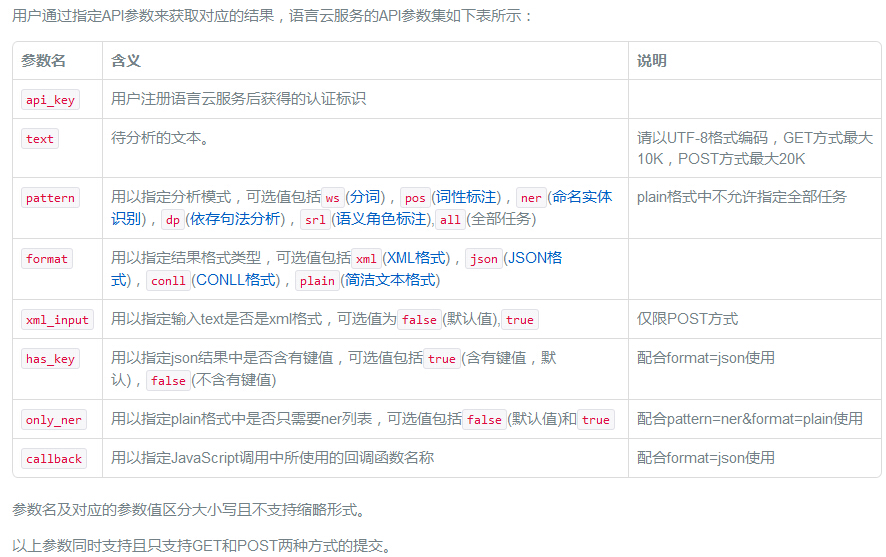ZH奶酪:自然语言处理工具LTP语言云调用方法
2015-06-18 10:28
651 查看
前言
LTP语言云平台
不支持离线调用;
支持分词、词性标注、命名实体识别、依存句法分析、语义角色标注;
不支持自定义词表,但是你可以先用其他支持自定义分词的工具(例如中科院的NLPIR)把文本进行分词,再让ltp帮你标注
支持C#、Go、Java、JavaScript、Nodejs、PHP、Python、R、Ruby等语言调用;
还有一些错误响应、频率限制、重要说明(这几个我至今也没用到);
正文
官方网址:http://www.ltp-cloud.com/
使用文档:http://www.ltp-cloud.com/document/
在线演示:http://www.ltp-cloud.com/demo/
各种语言调用实例可以到Github上下载:https://github.com/HIT-SCIR/ltp-cloud-api-tutorial
例如Python版本的:https://github.com/HIT-SCIR/ltp-cloud-api-tutorial/tree/master/Python
Step1:注册
在这个网址申请一个API key,稍后会用到;
Step2:一个简单的例子(Python版)
(1)复制代码:从Github上复制一段代码(取决于你使用的语言和所需的功能)
(2)修改代码:
<1>把 api_key = "YourApiKey" 中的 "YourApiKey" 修改成你Step1申请的API Key;
<2>把 text = "我爱北京天安门" 修改成你要处理的文本;
<3>根据需求设置不同的参数(其实只需要api_key,text,pattern,format四个参数就够了,仔细看下pattern):

Step3:运行
如果要批量处理txt或者xml文件,需要自己写一段批量处理的代码,下边是我之前项目中用到的一段批量处理某一目录下txt文件代码(就是加了一层循环和设置了一个输出):
LTP语言云平台
不支持离线调用;
支持分词、词性标注、命名实体识别、依存句法分析、语义角色标注;
不支持自定义词表,但是你可以先用其他支持自定义分词的工具(例如中科院的NLPIR)把文本进行分词,再让ltp帮你标注
支持C#、Go、Java、JavaScript、Nodejs、PHP、Python、R、Ruby等语言调用;
还有一些错误响应、频率限制、重要说明(这几个我至今也没用到);
正文
官方网址:http://www.ltp-cloud.com/
使用文档:http://www.ltp-cloud.com/document/
在线演示:http://www.ltp-cloud.com/demo/
各种语言调用实例可以到Github上下载:https://github.com/HIT-SCIR/ltp-cloud-api-tutorial
例如Python版本的:https://github.com/HIT-SCIR/ltp-cloud-api-tutorial/tree/master/Python
Step1:注册
在这个网址申请一个API key,稍后会用到;
Step2:一个简单的例子(Python版)
(1)复制代码:从Github上复制一段代码(取决于你使用的语言和所需的功能)
(2)修改代码:
<1>把 api_key = "YourApiKey" 中的 "YourApiKey" 修改成你Step1申请的API Key;
<2>把 text = "我爱北京天安门" 修改成你要处理的文本;
<3>根据需求设置不同的参数(其实只需要api_key,text,pattern,format四个参数就够了,仔细看下pattern):

# -*- coding: utf-8 -*- #!/usr/bin/env python # This example shows how to use Python to access the LTP API to perform full # stack Chinese text analysis including word segmentation, POS tagging, dep- # endency parsing, name entity recognization and semantic role labeling and # get the result in specified format. import urllib2, urllib import sys if __name__ == '__main__': if len(sys.argv) < 2 or sys.argv[1] not in ["xml", "json", "conll"]: print >> sys.stderr, "usage: %s [xml/json/conll]" % sys.argv[0] sys.exit(1) uri_base = "http://ltpapi.voicecloud.cn/analysis/?" api_key = "YourApiKey" text = "我爱北京天安门" # Note that if your text contain special characters such as linefeed or '&', # you need to use urlencode to encode your data text = urllib.quote(text) format = sys.argv[1] pattern = "all" url = (uri_base + "api_key=" + api_key + "&" + "text=" + text + "&" + "format=" + format + "&" + "pattern=" + "all") try: response = urllib2.urlopen(url) content = response.read().strip() print content except urllib2.HTTPError, e: print >> sys.stderr, e.reason
Step3:运行
如果要批量处理txt或者xml文件,需要自己写一段批量处理的代码,下边是我之前项目中用到的一段批量处理某一目录下txt文件代码(就是加了一层循环和设置了一个输出):
# -*- coding: utf-8 -*-
#!/usr/bin/env python
# This example shows how to use Python to access the LTP API to perform full
# stack Chinese text analysis including word segmentation, POS tagging, dep-
# endency parsing, name entity recognization and semantic role labeling and
# get the result in specified format.
import urllib2, urllib
import sys
if __name__ == '__main__':
uri_base = "http://ltpapi.voicecloud.cn/analysis/?"
api_key = "7132G4z1HE3S********DSxtNcmA1jScSE5XumAI"
f = open("E:\\PyProj\\Others\\rite_sentence.txt")
fw = open("E:\\PyProj\\Others\\rite_pos.txt",'w')
line = f.readline()
while(line):
text = line
# Note that if your text contain special characters such as linefeed or '&',
# you need to use urlencode to encode your data
text = urllib.quote(text)
format = "plain"
pattern = "pos"
url = (uri_base
+ "api_key=" + api_key + "&"
+ "text=" + text + "&"
+ "format=" + format + "&"
+ "pattern=" + pattern)
try:
response = urllib2.urlopen(url)
content = response.read().strip()
print content
fw.write(line+content+'\n')
except urllib2.HTTPError, e:
print >> sys.stderr, e.reason
line = f.readline()
fw.close()
f.close()
相关文章推荐
- 试用php中oci8扩展
- 基于php的登录注册,以及一些常识
- ThinkPHP查询数据与CURD
- php---本地开发及测试环境搭建(Wamp)
- Socket 深度探究 4 PHP (三)
- Socket 深度探究 4 PHP (二)
- Socket 深度探索 4 PHP (一)
- php socket通信
- 基于PHP实现的事件机制实例分析
- RSA 加解密的例子,JS加密--php解密
- php使用MySQL保存session会话的方法
- php判断表是否存在的方法
- 四种排序算法PHP实现类
- php面向对象基础概念(接口)
- php判断表是否存在的方法
- php使用MySQL保存session会话的方法
- 基于PHP实现的事件机制实例分析
- 试用php中oci8扩展
- php编写简单的文章发布程序
- php遍历树的常用方法汇总
